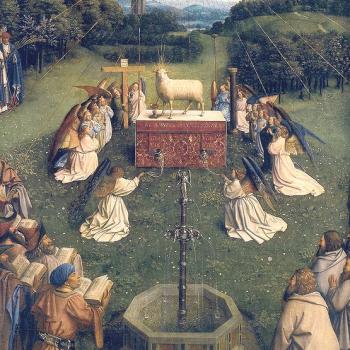Reply to a Lutheran Who Was Offended by Being Excluded

(10-30-08)
This comes from exchanges on the Coming Home Network forum. The woman whose words are in blue is the wife of the man in question. She is a Catholic.
* * *
After attending Mass just twice with me, my Lutheran husband refuses to go ever again because of the Church’s “rules” about Communion. He believes it is wrong to tell anyone they cannot receive Communion, for any reason—in other words, no one should be excommunicated, and Protestants should be welcome to receive, regardless of what they think it means (the true Body and Blood or just a symbol). His basis for this belief is the portrayal of The Last Supper in the Bible: Jesus said, “Do this,” and no one was turned away, not even Judas, who was the betrayer. I trust that Holy Mother Church knows what she’s doing when she says people must be “properly disposed” to receive and be “in communion to receive Communion.” My husband feels the Church has not earned this trust and that all the lack of Christian unity is the Roman Catholic Church’s fault (for insisting people accept every single thing the Magisterium says as Truth). Like that somehow, if the Church would just welcome everyone with open arms and allow all to receive Communion, the rift would begin to mend. (Would it? But that’s a different question!) In the meantime, he is unwilling to budge. Are there Scriptures or writings from early Church history which demonstrate that it’s okay with Jesus to turn people away from the Eucharist? (Or, if not turn them away, then at least have this clear teaching that only Catholics in good standing are supposed to receive?) One of you smart guys or gals on here must be able offer some insight. I’ve been struggling with this issue for months.
Great question. It’s not a lack of charity at all; it is a biblical mandate. That’s the bottom line: what does Scripture say about who should receive communion, and what that act signifies (in the corporate sense)? Several Christian groups have closed communion: not just Catholics (Missouri Synod Lutherans come to mind).
I have mentioned to my husband about other Christians who have closed Communion (including some Lutherans), but he thinks they are ALL WRONG—which is why he is picky about which Lutheran church he goes to. I was remembering this a.m., though, that we had to become MEMBERS of our Lutheran churches before the pastors would baptize our babies there. Isn’t that kind of the same thing/just as “bad,” if one is going to make a fuss? This issue, more than anything else, is what keeps my husband from considering joining the Catholic Church. He doesn’t agree with the Marian doctrines, either, but the Eucharist is the real stumbling block.
I think the Bible is fairly clear that the Christian community is to be united in doctrine. This is presupposed before they take Holy Communion together. It’s precisely why the early Church took a long time with converts: they had to thoroughly understand and accept the Catholic faith before being allowed to the communion table.
Your husband may have many reasons he gives for his opinion on this, but he has to ground them at some point in Scripture: that which Protestants and Catholics hold in common, and which both regard as inspired revelation.
My husband sees Communion as a beautiful thing, as well, but that’s partly why he has such a problem with “men” keeping people away from Jesus (by keeping them from taking Communion). It makes so much sense to us who understand how TRULY big a deal this is, but my husband comes from the Lutheran tradition, which acknowledges the “Real Presence” but doesn’t really treat the sacrament as if it really IS Jesus (for instance, if they use a loaf of bread from the grocery store to do Communion, they don’t really have a problem with tossing out the leftovers).
[Dave: various Lutherans differ on their beliefs in this regard]
I would like to say that I have been totally enjoying reading your blog/website. I am learning a lot there (reading about the Reformation now). Trying to get up the courage to direct my husband to that site. Any mention of anything Catholic stirs up tension between us, so generally I try to avoid bringing things up—though we have done plenty of discussing. It wears me out!
The info on your site is a lot to take in. For me, it’s been great affirmation for my decision to leave Protestantism and become (go back to being) a Catholic. Still, my husband loves, in arguments, to bring up the terrible things done by Catholics to “keep people in line” in the past (e.g., the Spanish Inquisition and so forth). I remind him of the many acts of violence done by Protestants to Catholics, but other than invasions of monasteries, I usually don’t have too many examples (and honestly, I think he thinks they probably deserved it). Your blog is an ARSENAL of such info! I will, however, hold off on directing him there until I am sure he is ready for it. And even then, it will probably only make him mad. He is extremely smart and remembers everything and seems able to win any argument. He’s mostly intellect, I’m mostly emotion, so you can see how I don’t do too well trying to persuade him of anything. He prefers to read Lutheran websites that will keep him grounded in the faith tradition of his youth.
* * *
On a very recent episode of “The Journey Home,” someone e-mailed to ask about this very topic—he and his wife had converted and his wife still struggled with Protestants being unable to take Communion. In reply, Marcus mentioned that up until about 200 years ago, ALL churches (as far as he knew) had closed Communion. He seemed to indicate that this started changing as more and more Protestant churches splintered into new denominations and as the churches became more liberal. Does anyone know anything about this or know where I could find out more about how this happened and why? If I’m going to mention this to my husband, he is going to want FACTS—names and dates and places, that sort of thing—or else he won’t believe it.
* * *
My husband and I had another of our long discussions just the other night. Nothing I said had any effect on him. He says that when he sits in a Catholic Mass, all he can feel is rejection. Regardless of the fact that he believes every word of the Creed and does in fact believe in the Real Presence, the unspoken message at Mass (from his perspective) is this: “Since you refuse to accept every single Catholic teaching as absolute Truth, you are not a ‘true’ Christian, and therefore, you may not receive Jesus through Communion in this place.” For him, it all boils down to authority. Plain and simple, he cannot accept that the Catholic Church legitimately possesses the authority it claims for itself. Because of this, many Catholic teachings are suspect. I’ll have to address these in other threads in the forum. In the meantime, I just keep praying for unity. It’s all in God’s hands.
* * *
the unspoken message at Mass (from his perspective) is this: “Since you refuse to accept every single Catholic teaching as absolute Truth, you are not a ‘true’ Christian, and therefore, you may not receive Jesus through Communion in this place.”
Likewise, being a Catholic means something intellectually; doctrinally. Many denominations care little about doctrinal distinctives, but we do, and so did all the early Protestants (and, I would say, Jesus and the apostles and Church fathers). We presuppose a doctrinal unity. Taking communion is being part of the Catholic Church. Therefore, one who doesn’t agree with Catholic teachings cannot partake. What’s so complicated or controversial about that (I’m writing rhetorically now, with your husband in mind)?
I’ve never understood, myself, why this is so vexing to some people. I really don’t get it. I would never dream of partaking in a Protestant service. It would have never crossed my mind, back when I was a Protestant, to partake of communion in a service (let alone to be offended that I wasn’t allowed to), if I knew that they had membership requirements, or even if I personally disagreed with them on doctrine (even if they allowed intercommunion themselves).
To me it was a simple matter of both respect for one’s surroundings and honesty. I wasn’t one of them, by choice. Why would I want to, in effect, pretend to be one of them, by doing everything that they do when they get together to worship God?
This attitude perhaps has something to do with a sort of theological relativism (I’m trying to comprehend it now, by speculating as to its ultimate cause). This is the thinking that holds that we’re all in the same boat. Honestly-held differences don’t matter anymore. But this is an insult to all the men and women of any Christian stripe who lived and fought and strove for the promulgation of the distinctive beliefs that they truly believed in with all their hearts and souls (some even dying for those faiths and visions). In the past, people at least recognized that there was one truth, and that one had to argue and contend about that truth (Jude 3). They didn’t just say it was irrelevant, and that anyone who named the name of Jesus could receive the Holy Eucharist, even if they had a heretical notion even of Who Jesus was.
This sort of analysis was eloquently stated by my friend Al Kresta, in a marvelous talk detailing his conversion (reversion) story, given in my own home, that I later transcribed. He was critiquing the notion of “mere Christianity”:
Mere Christianity also undermines confidence in the local church, or (if you believe in them) the denomination, which is secondary to one’s primary commitment to Christ. But this is schizophrenic. It pits the head against the body, and ultimately it betrays Jesus Who says the gates of hell would not prevail against His Church, the body. These things are connected. The head doesn’t regard the body as a “necessary evil” like many evangelicals do. They think that you gotta go somewhere to get Bible teaching, so you go to church. [The Church] is secondary only in the sense that it flows from my commitment to God, and is entailed in that commitment. How ecumenical is mere Christianity, if it removes the doctrine of the Church, which is central to two of the three Christian traditions? So it really isn’t very fair to Orthodoxy and Catholicism. [It amounts to saying that] God is not able to adequately reveal Himself through the things that he has made, or the people that He has called. It’s a slap in the face of God.
Mere Christianity is dishonest in that it requires a soft-peddling of differences between Christians. And it belittles our brothers and sisters in the past. When we say “let’s transcend and rise above all these denominational distinctives,” we are actually emasculating the various Christian traditions. The very things that Wesley and Luther and Calvin found as solutions to the problems of their day, we’re saying, “it’s not important. Let’s just get above ’em. It doesn’t matter that these brothers regarded these things as central and essential to the Christian life.
We’re so superior to them that we can just rise above it.” And I find that that’s a very belittling approach to these men and women. Accept them on their own terms. Disagree with them if you have to. But don’t say they’re irrelevant. Within their systems, these denominational distinctives are meant to be solutions to serious problems in the Christian life, and when we don’t take them on their own terms, then we’re regarding these men and their traditions as pathological, petty, or unwise. I think Luther was wrong [about justification], but I can’t say he’s unimportant, you see. And that’s what I don’t like about “mere Christianity.”
For him, it all boils down to authority. Plain and simple, he cannot accept that the Catholic Church legitimately possesses the authority it claims for itself.
I find this ironic, because he has now contradicted himself, when one steps back and closely scrutinizes what he is maintaining. He objects to the Catholic Church drawing lines based on its own understanding of requirements for Holy Communion, worked out from the very beginning of Church history (in the early days of the Church, new catechumens went through a long, arduous process of education and spiritual formation before even being allowed into the second part of the Mass).
He rejects Catholic authority, yet at the same time is offended that he is not allowed to be part of the ritual that this same authority — that he rejects –, sensibly sets limits to. Note the comparison between the following two things:
1) Rejecting the self-understood authority of a form of Christianity.
or:
2) Rejecting the rules that same Christian body sets for itself and being offended that they don’t bend to everyone’s whim and fancy.
I would contend that anyone can and should honestly exercise their minds and conscience and supernatural, God-given faith in determining which faith is true or the most true. That’s an honest and honorable exercise (and we encourage it on this forum and in CHNI as a whole, as part of our very purpose). But being tiffed and miffed because some Christian group says we can’t receive communion with them is both irrational and also arguably dishonest.
If he can reject Catholic claims of authority altogether, why does he not recognize that the Catholic Church can consistently reject his assumed arguments for receiving the Eucharist in a Catholic Mass? He doesn’t set the rules for this body that he rejects; they do! So why in the world does this offend him? Should I hold a grudge against Harvard Law School my entire life, if I didn’t meet the requirements to get into the school? Are they supposed to bend their entire rules and “tradition” just so I can come in and not be offended? It makes no sense. The two propositions don’t go together. He needs to work through the issue in a more self-consistent manner.
I was a bit more rigorous and “tough” in this reflection because we’re dealing with a person who seems to pride himself on his thinking and skepticism (by your report). Well, then I am challenging him to be much more aware of his premises and the illogical and inconsistent conclusions that he has deduced from them. If he truly loves thinking and logic, and so forth, then he’ll welcome the challenge and not get angry, because that is what thinkers do. They love the challenge (just like the fathers did with regard to the challenge of heretics), because it lets them exercise their minds and analytical abilities, to better defend what they already believe, or else discard their position as inadequate to answer the critiques directed towards it.
*****
Meta Description: Explanation for why Catholics believe one must accept all Catholic teachings in order to receive Holy Communion.
Meta Keywords: closed communion, Holy communion, Protestants & Catholic communion, Eucharist, The Mass












